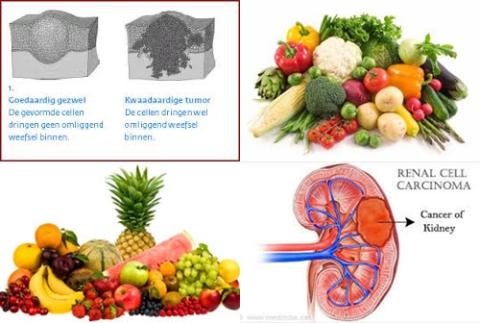
Objectives:
There have been inconsistent results about the association between consumption of fruits and vegetables and renal cell carcinoma (RCC) risk. Therefore, this review article (meta-analysis) has been conducted.
Does consumption of fruits and vegetables reduce renal cell carcinoma risk?
Study design:
This review article included 19 observational studies (4 cohort, 1 pooled and 14 case-control studies), involving 10,215 subjects with renal cell carcinoma.
Only 4 studies adjusted for all the 3 main risk factors for renal cell carcinoma (16 studies adjusted for tobacco smoking, 15 for BMI and 4 for hypertension).
The majority of included studies (16/19) were of high quality (NOS score ≥ 7).
Results and conclusions:
The investigators found for highest vs. lowest vegetables intake a significant reduced risk of 27% for renal cell carcinoma [SRR = 0.73, 95% CI = 0.63-0.85, I2 = 53.5%, p = 0.004]. Significant means that there is an association with a 95% confidence.
The investigators found for highest vs. lowest vegetables intake a non-significant reduced risk of 13% for renal cell carcinoma in cohort studies [SRR = 0.87, 95% CI = 0.72-1.06].
The investigators found in dose-response analysis a significant reduced risk of 10% for renal cell carcinoma per 1 serving/day vegetables intake [SRR = 0.90, 95% CI = 0.84-0.96, I2 = 69.0%, p 0.001].
The investigators found a non-linear association between vegetable intake and renal cell carcinoma risk [p = 0.001 for non-linearity] with a significant reduction in renal cell carcinoma risk when increasing the intake up to about 3 servings/d intake of vegetables. Higher intake was associated with a further, but more modest decrease in risk.
The investigators found for highest vs. lowest fruits intake a significant reduced risk of 14% for renal cell carcinoma [SRR = 0.86, 95% CI = 0.75-0.98, I2 = 47.4%, p = 0.012].
The investigators found for highest vs. lowest fruits intake a significant reduced risk of 28% for renal cell carcinoma among European [SRR = 0.72, 95% CI = 0.56-0.93]. However, this reduced risk was not significant among North Americans [SRR = 0.97, 95% CI = 0.81-1.16].
The investigators found for highest vs. lowest fruits intake a significant reduced risk of 22% for renal cell carcinoma in population-based case-control studies [SRR = 0.78, 95% CI = 0.63-0.97]. However, this reduced risk was not significant in cohort studies [SRR = 0.90, 95% CI = 0.73-1.10] and in hospital-based case-control studies [SRR = 0.96, 95% CI = 0.69-1.33].
The investigators found in dose-response analysis no associaition between 1 serving/day increment of fruits and renal cell carcinoma risk [SRR = 0.97, 95% CI = 0.93-1.01, I2 = 57.8%, p = 0.011].
The investigators found a linear association between fruits intake and renal cell carcinoma risk [p = 0.221 for non-linearity].
The investigators concluded that consumption of 1-3 servings/d vegetables and high fruits may lower the risk of renal cell carcinoma development. May lower, because significant associations for vegetables and fruits were only observed in case-control, but not in cohort studies. Because of the measurement errors of exposure assessment, the high heterogeneity across studies and unmeasured confounding factors, further investigation with good designs are needed.
Original title:
Consumption of fruits and vegetables and risk of renal cell carcinoma: a meta-analysis of observational studies by Zhang S, Jia Z, [...], Yang J.
Link:
https://www.ncbi.nlm.nih.gov/pmc/articles/PMC5438616/
Additional information of El Mondo:
Find more information/studies on vegetables and fruits consumption, significant/cohort/95% CI and cancer right here.